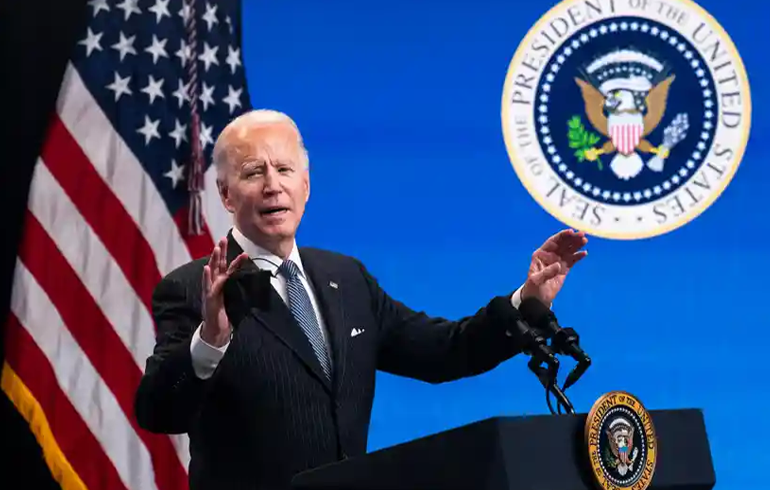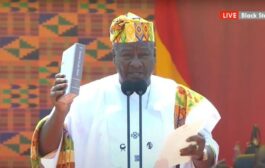US President Joe Biden will sign a series of executive orders aimed to address climate change, including a new ban on some energy drilling.
The orders aim to freeze new oil and gas leases on public lands and double offshore wind-produced energy by 2030.
They are expected to meet stiff resistance from the energy industry and come as a sea change from Donald Trump, who cut environmental protections.
Mr Biden will also label climate change a “national security” priority.
The series of executive orders that Mr Biden is due to sign on Wednesday will establish a White House office of domestic climate policy and announce a summit of leaders in the movement to tackle climate change to be held in April.
Mr Biden will also call upon the US Director of National Intelligence to prepare an intelligence report on the security implications of climate change.
What will the orders do?
Mr Biden is using the power he has as president to make climate change a central issue of his administration.
The executive orders and memorandum – which cannot go as far as congressional legislation in combating climate change – can be undone by future presidents, as he is currently doing to Mr Trump.
According to a statement from the White House, Mr Biden will direct the Department of the Interior, which oversees federal public lands, to pause oil and gas drilling leases on federal lands and water “to the extent possible” and to launch a review of existing energy leases.
Mr Biden aims to conserve at least 30 percent of federal lands and oceans by 2030.
According to the New York Times, fossil fuel extraction on public lands accounts for almost a quarter of all US carbon dioxide emissions.
Public lands are controlled by the federal government. Mr Biden’s order does not affect private property owners or state-held public lands.
Mr Biden’s “whole-of-government” approach, the White House says, will create the first-ever National Climate Advisor who will lead the office of Domestic Climate Policy at the White House.
Later today, Mr Biden’s envoy for climate – another new position – will join the White House press briefing.
The orders also direct all federal agencies to develop plans for how climate change will affect their facilities and operations.
It also will require agencies to determine ways to help the public better access climate change forecasts and information.
Mr Biden is also making it clear his administration will make decisions based on the best science available.
He’s directed agencies to only make “evidence-based decisions guided by the best available science and data”.
What do the orders say about jobs?
Mr Biden’s fiercest critics say that his climate change initiatives will cut American jobs as the country already suffers from record unemployment numbers amidst the Covid-19 pandemic.
He received a storm of criticism for last week’s executive order halting construction of the Keystone XL pipeline, that would have transported oil from Canada through the US.
But the Biden White House is trying to get ahead of more criticism by addressing job creation in these new executive orders.
His plan calls for the creation of new jobs in the environmental industry, and directs federal agencies to end fossil fuel subsidies and “identify new opportunities to spur innovation, commercialisation, and deployment of clean energy technologies and infrastructure”.
It calls for the creation of a “Civilian Climate Corps Initiative” – a jobs initiative that Biden officials say will “put a new generation of Americans to work conserving and restoring public lands and waters”.
How does it differ from Trump?
During his four years in office, Mr Trump expanded the number of energy leases on environmentally sensitive national lands.
He also rolled back dozens of rules designed to ensure access to clean air and water, protections for wildlife, and the containment of dangerous chemicals and pollutants.
The changes, which were mostly executed by the Environmental Protection Agency and the Department of Interior, came in response to what the Trump administration called overly-burdensome regulations that stymied US industries.
Some of the changes under Mr Trump, including one that sought to relax pollution rules affecting coal and gas-burning power plants, were overturned by federal courts.
Mr Trump also took the US out of the Paris climate accords, whereas Mr Biden made moves to re-join the global agreement on his first day in office.
Mr Trump also repeatedly cast doubts on the existence of climate change, at times calling it a Chinese-created “hoax” invented to disrupt the US economy.
“It’ll start getting cooler. You just watch,” he told a scientist in California last year while meeting with emergency wildfire officials.
“I don’t think science knows, actually,” he continued.
Mr Biden’s initiatives are a stark divergence from the former president.
Source: BBC



















































